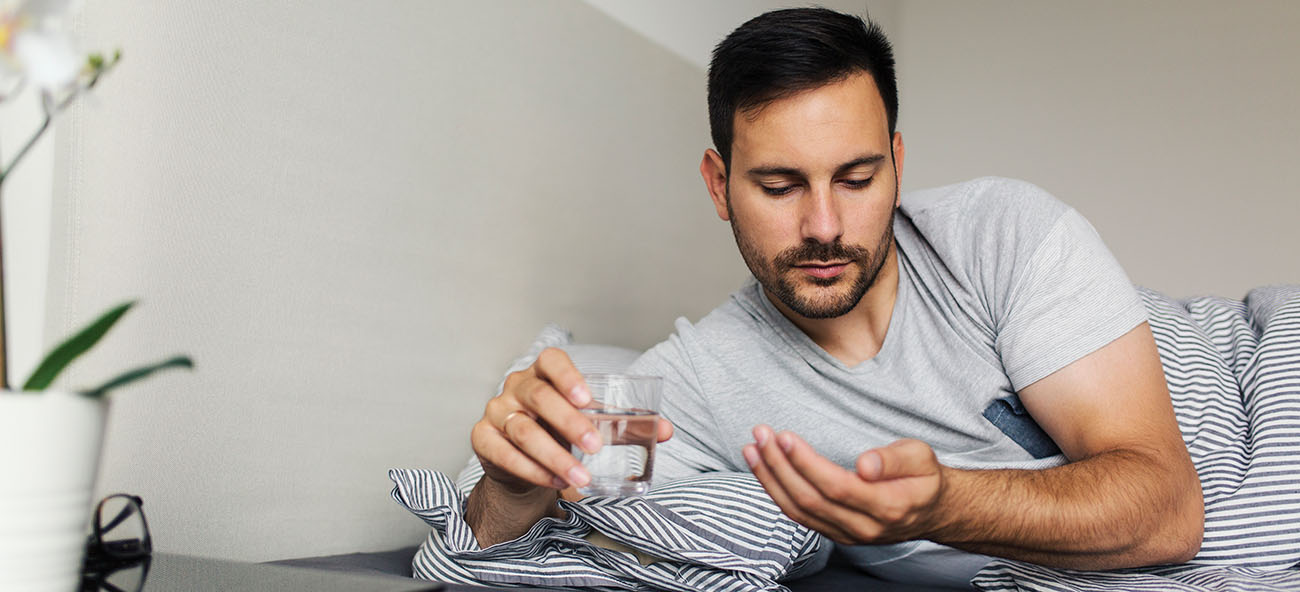During the Covid-19 pandemic, many people have found that their sleep has been adversely affected. While everyone won’t be affected in the same way, reasons why sleep may be affected include:1
- Disruption of daily life
- Anxiety and worry
- Isolation and depression
- Increased family and work stress
- More screen time
- Stress-related fatigue.

Ways to help improve sleep
There are a number of lifestyle changes customers can try to help improve their sleep. Click on the options below to find out more.
Relaxing before bed can help a person get a good night’s sleep. Ways to relax include having a warm bath to help the body reach an ideal temperature for sleep; relaxation exercises such as light yoga stretches to help relax the muscles; using relaxation CDs or podcasts; reading a book; or listening to the radio to help relax the mind.4
Mindfulness has been shown to make it easier to fall asleep, improve sleep time and sleep quality. It is all about understanding ourselves better and enjoying the world around us by being more aware of the present moment. One technique is using mindfulness meditation before bedtime. This involves sitting quietly and paying attention to thoughts, sounds and sensations (commonly the sensations of breathing or parts of the body) to help clear the mind.5,6
Some people find aromatherapy using essential oils useful to improve their physical and mental wellbeing as well as helping them to relax before bed. Essential oils to help with improving relaxation include lavender, camomile, bergamot and marjoram.7-10 Aromatherapy can be used in different ways before bedtime, e.g. using essential oils for massage or products containing essential oils such as a pillow spray.
If the customer has tried some of the relaxation techniques above and is still having difficulty sleeping there are also several herbal products, including traditional herbal remedies, available that may help support them to get a good night’s sleep. These usually contain ingredients such as valerian root, camomile, passionflower, hops and lemon balm.11 Before recommending a herbal product, always check if a customer is taking any other medicines and the packaging or PIL for how long the product should be used for. Most herbal remedies are for short-term use only.
Antihistamine sleep medicines
If someone is having difficulty sleeping and would like further advice, it may be appropriate to recommend a P medicine sleeping product containing an antihistamine that causes drowsiness, such as diphenhydramine. These products are only recommended for short-term use to help reduce the risk of psychological dependence on sleeping tablets. You should also advise customers that antihistamines may have side effects including residual drowsiness the following day.12
40% of people have issues with sleeping.13

Energy and nutrients
Customers who are feeling tired may ask you about food supplements. Some nutrients may help with energy, such as iron and vitamin B12, which contribute to the reduction of tiredness and fatigue. Having a healthy, balanced diet can help customers get the energy, vitamins and minerals they need, but there are various supplements available for those who may wish to supplement their diet.
When to refer
Customers should be referred to their GP if:12
- Self-care advice and changing their sleeping habits hasn’t worked
- They have had difficulty sleeping for months
- Their insomnia is affecting their daily life in a way that makes it difficult for them to cope.
